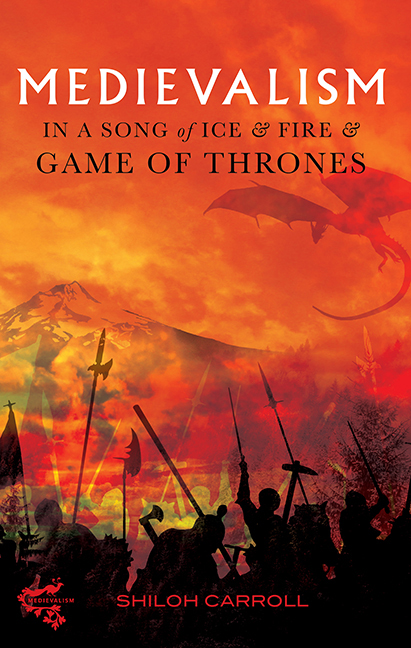Book contents
- Frontmatter
- Contents
- Acknowledgements
- Author's Note
- Introduction: Martin and Medievalist Fantasy
- 1 Chivalric Romance and Anti-Romance
- 2 Masculinity, Femininity, and Gender Relations
- 3 Sex and Sexuality
- 4 Postcolonialism, Slavery, and the Great White Hope
- 5 Adaptation and Reception
- Afterword: “Fantasy for people who hate fantasy”
- Bibliography
- Index
- Medievalism
Introduction: Martin and Medievalist Fantasy
Published online by Cambridge University Press: 09 October 2019
- Frontmatter
- Contents
- Acknowledgements
- Author's Note
- Introduction: Martin and Medievalist Fantasy
- 1 Chivalric Romance and Anti-Romance
- 2 Masculinity, Femininity, and Gender Relations
- 3 Sex and Sexuality
- 4 Postcolonialism, Slavery, and the Great White Hope
- 5 Adaptation and Reception
- Afterword: “Fantasy for people who hate fantasy”
- Bibliography
- Index
- Medievalism
Summary
GEORGE RAYMOND RICHARD MARTIN is well known among fantasy fans and in the greater pop-culture zeitgeist, primarily for his epic fantasy series A Song of Ice and Fire (1996–), which has been adapted as Game of Thrones (2011–), a TV series on HBO. However, A Song of Ice and Fire is hardly his only fiction, and Game of Thrones hardly his only foray into television writing and production. Martin began writing fiction at a young age, using his collection of Miller Aliens toys and pet turtles as inspiration for science-fiction stories. When one of his college professors allowed him to write a historical-fiction story rather than a term paper, then submitted it to a magazine on Martin's behalf, Martin discovered that submitting and being rejected was not as bad as he had feared and began pursuing publication on his own. His first professional publication was a science-fiction story in Galaxy magazine in 1971; since then he has published science fiction, fantasy, and horror. In 1983, he released Armageddon Rag, a novel about a rock band that was equal parts love letter to and chiding of the Baby Boomer generation. Unexpectedly, it failed on the market and, in his words, “essentially destroyed my career as a novelist at the time.” However, this failure led to opportunities in Hollywood; the screenwriter who attempted to turn Armageddon Rag into a movie hired Martin as a writer for The Twilight Zone (1985–9), and thereafter, he worked on other TV shows such as Beauty and the Beast (1987–90) and The Outer Limits (1995–2002). He has won four Hugo and two Locus awards for his short fiction, two Hugos for screenwriting for Game of Thrones, and an Emmy for Game of Thrones.
Martin has expressed frustration with working in television, claiming that it was not as rewarding as writing prose fiction. He was frequently asked to reduce the size of his cast, down-scale the effects, or cut back other aspects of his scripts that would render them too expensive to shoot. He also struggled with attempts to write and produce new shows that were not picked up by studios, saying that undertaking all that work without a reader or a viewer was “ultimately unsatisfying.”
- Type
- Chapter
- Information
- Publisher: Boydell & BrewerPrint publication year: 2018

